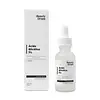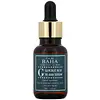What's inside
What's inside
 Key Ingredients
Key Ingredients

 Benefits
Benefits

 Concerns
Concerns

 Ingredients Side-by-side
Ingredients Side-by-side

Water
Skin ConditioningRosa Damascena Flower Water
MaskingGlycerin
HumectantPropanediol
SolventGlycolic Acid
BufferingBetaine
HumectantAloe Barbadensis Leaf Juice
Skin ConditioningCalendula Officinalis Flower Extract
MaskingProline
Skin ConditioningSodium Allantoin PCA
Skin ConditioningSodium PCA
HumectantLysine Hcl
Skin ConditioningGlucose
HumectantFructose
HumectantSucrose
HumectantGlutamic Acid
HumectantEthylhexylglycerin
Skin ConditioningThreonine
Urea
BufferingGlycine
BufferingSodium Lactate
BufferingSodium Phytate
Gluconolactone
Skin ConditioningCalcium Gluconate
HumectantArginine
MaskingSerine
MaskingAlanine
MaskingAspartic Acid
MaskingHexyl Nicotinate
EmollientTocopherol
AntioxidantDextrin
AbsorbentPolyacrylate Crosspolymer-6
Emulsion StabilisingT-Butyl Alcohol
PerfumingHexylene Glycol
EmulsifyingSodium Benzoate
MaskingPotassium Sorbate
PreservativePhenoxyethanol
PreservativeWater, Rosa Damascena Flower Water, Glycerin, Propanediol, Glycolic Acid, Betaine, Aloe Barbadensis Leaf Juice, Calendula Officinalis Flower Extract, Proline, Sodium Allantoin PCA, Sodium PCA, Lysine Hcl, Glucose, Fructose, Sucrose, Glutamic Acid, Ethylhexylglycerin, Threonine, Urea, Glycine, Sodium Lactate, Sodium Phytate, Gluconolactone, Calcium Gluconate, Arginine, Serine, Alanine, Aspartic Acid, Hexyl Nicotinate, Tocopherol, Dextrin, Polyacrylate Crosspolymer-6, T-Butyl Alcohol, Hexylene Glycol, Sodium Benzoate, Potassium Sorbate, Phenoxyethanol
Ingredients Explained
These ingredients are found in both products.
Ingredients higher up in an ingredient list are typically present in a larger amount.
Arginine is an amino acid that is important for human development. Your body uses is it to produce hair keratin and skin collagen.
As a cosmetic ingredient, Arginine has antioxidant properties and can also help repair damaged skin. This ingredient is derived either synthetically or from animals.
Arginine isn't fungal acne safe when used in the presence of other lipids (fats, fatty acids, oils, esters, etc). Oils and fats occur naturally within the skin, so take caution when using Arginine if you're prone to fungal acne.
Learn more about ArginineGlycolic Acid is arguably the most famous alpha hydroxy acid (AHA) with tons of research backing its benefits.
It is found naturally in sugar cane but the form used in skincare is usually synthetic for purity and stability.
Glycolic acid removes the top layer of dead skin cells to allow newer and fresher ones to emerge.
AHAs work by breaking down the structural “glue” that holds old skin cells in place. When that buildup is gone, your skin can renew itself more efficiently.
Research also shows glycolic acid stimulates collagen production, helping to firm and thicken the skin over time. This is one of its biggest advantages over other AHAs.
Overall, glycolic acid helps with:
Fun fact: Glycolic acid boosts skin hydration by helping it produce molecules that increase hyaluronic acid naturally.
To work best, glycolic acid products should have a pH between 3-4 (that’s where exfoliation is most effective but still gentle on skin).
The pH and concentration of a product are key to its effectiveness:
It is normal to feel a slight stinging sensation when using glycolic acid. This usually fades as your skin adjusts.
Because glycolic acid has the smallest molecular size in the AHA family, it can penetrate deeper, which enhances its effectiveness but also makes it more likely to irritate sensitive skin.
If your skin is very sensitive or prone to rosacea, glycolic acid may be too strong; in that case, try milder options like lactic acid or a PHA instead.
Recent studies suggest glycolic acid might even help protect against UV damage. But don’t skip sunscreen! Freshly exfoliated skin is more sensitive to the sun.
Glycolic acid is a skincare superstar. It smooths, brightens, hydrates, and firms the skin. Unless you’re highly sensitive, it’s well worth adding to your routine.
Read more about some other popular AHA's here:
Learn more about Glycolic AcidPropanediol is an all-star ingredient. It softens, hydrates, and smooths the skin.
It’s often used to:
Propanediol is not likely to cause sensitivity and considered safe to use. It is derived from corn or petroleum with a clear color and no scent.
Learn more about PropanediolWater. It's the most common cosmetic ingredient of all. You'll usually see it at the top of ingredient lists, meaning that it makes up the largest part of the product.
So why is it so popular? Water most often acts as a solvent - this means that it helps dissolve other ingredients into the formulation.
You'll also recognize water as that liquid we all need to stay alive. If you see this, drink a glass of water. Stay hydrated!
Learn more about Water